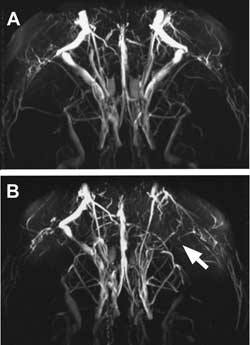Autoantibodies Damage Blood Vessels in the Brain – Important Factor in the Development of Dementia

Antibodies damage blood vessels in the brain of rats (see arrow in image B). Eight months after the rats were administered an antibody against a surface protein (alpha1-adrenergic receptor) in the vascular cells, the blood vessels are hardly recognizable, because the blood flow has been interrupted. Image A shows the blood vessels (white) in the brain of healthy animals with no antibodies. These findings are important for understanding the pathogenesis and progression of Alzheimer’s disease and vascular dementia.<br><br>(MR Angiography/Copyright: MDC)<br>
These findings were made by Marion Bimmler, a graduate engineer of medical laboratory diagnostics at the Max Delbrück Center for Molecular Medicine (MDC) Berlin-Buch and Dr. Peter Karczewski of the biotech company E.R.D.E.-AAK-Diagnostik GmbH in studies on a rat model.
The researchers’ results suggest that autoimmune mechanisms play a significant role in the pathogenesis and progression of Alzheimer’s and vascular dementia (PloS ONE, doi:10.1371/journal.pone.0041602)*.
Antibodies are the defense molecules of the body’s immune system against foreign invaders. If the antibodies cease to distinguish between “foreign” and “self”, they attack the cells of the own body, and are thus referred to as autoantibodies. These can trigger autoimmune diseases. Using MR angiography and other methods, Marion Bimmler and her colleagues have now shown that the autoantibodies bind to specific surface proteins (alpha1 andrenergic receptors) of vascular cells and thereby damage the blood vessels of the brain. The reason: The autoantibodies generate a continual stimulation of the receptor and at the same time trigger an increase in intracellular calcium ion levels. As a result, the blood vessel walls thicken, and blood flow to the brain is disturbed.
First encouraging results after removal of autoantibodies by immunoadsorption
In earlier studies, Marion Bimmler and her research team examined blood samples of patients with Alzheimer‘s or vascular dementia and showed that half of them had comparable autoantibodies. A first clinical trial together with Charité – Universitätsmedizin Berlin is currently ongoing with a collective of patients with Alzheimer’s or vascular dementia. The patients were divided into two groups – a small group whose autoantibodies were removed from the blood via immunoadsorption and a control group that did not receive this treatment. Until now, over an observation period of 6 and subsequently 12 months, the patient group who had undergone immunoadsorption improved in their memory performance and in their ability to cope with their everyday lives. In contrast, the condition of the patients who did not receive immunoadsorption treatment and continued to have autoantibodies in their blood deteriorated dramatically. Now the researchers are planning further clinical trials with larger numbers of patients.
*Antibodies to the alpha1-Adrenergic Receptor Cause Vascular Impairments in Rat Brain as Demonstrated by Magnetic Resonance Angiography
Peter Karczewski, E.R.D.E.-AAK-Diagnostik GmbH, Berlin, Germany
Andreas Pohlmann, Berlin Ultrahigh Field Facility (B.U.F.F.), Max Delbrück Center for Molecular Medicine, Berlin, Germany
Babette Wagenhaus, Berlin Ultrahigh Field Facility (B.U.F.F.), Max Delbrück Center for Molecular Medicine, Berlin, Germany
Natali Wisbrun, Animal Facilities, Max Delbrueck Center for Molecular Medicine, Berlin, Germany
Petra Hempel, E.R.D.E.-AAK-Diagnostik GmbH, Berlin, Germany
Bernd Lemke, IT Department, Max Delbrueck Center for Molecular Medicine, Berlin, Germany
Rudolf Kunze, E.R.D.E. e.V., Berlin, Germany
Thoralf Niendorf, Berlin Ultrahigh Field Facility (B.U.F.F.), Max Delbrück Center for Molecular Medicine, Berlin, Germany
Marion Bimmler, Autoimmunity and G Protein-Coupled Receptors, Max Delbrueck Center for Molecular Medicine, Berlin, Germany
Contact:
Barbara Bachtler
Press Department
Max Delbrück Center for Molecular Medicine (MDC) Berlin-Buch
in the Helmholtz Association
Robert-Rössle-Straße 10; 13125 Berlin, Germany
Phone: +49 (0) 30 94 06 – 38 96; Fax: +49 (0) 30 94 06 – 38 33
e-mail: presse@mdc-berlin.de
Media Contact
More Information:
http://www.mdc-berlin.de/All latest news from the category: Life Sciences and Chemistry
Articles and reports from the Life Sciences and chemistry area deal with applied and basic research into modern biology, chemistry and human medicine.
Valuable information can be found on a range of life sciences fields including bacteriology, biochemistry, bionics, bioinformatics, biophysics, biotechnology, genetics, geobotany, human biology, marine biology, microbiology, molecular biology, cellular biology, zoology, bioinorganic chemistry, microchemistry and environmental chemistry.
Newest articles

Webb captures top of iconic horsehead nebula in unprecedented detail
NASA’s James Webb Space Telescope has captured the sharpest infrared images to date of a zoomed-in portion of one of the most distinctive objects in our skies, the Horsehead Nebula….

Cost-effective, high-capacity, and cyclable lithium-ion battery cathodes
Charge-recharge cycling of lithium-superrich iron oxide, a cost-effective and high-capacity cathode for new-generation lithium-ion batteries, can be greatly improved by doping with readily available mineral elements. The energy capacity and…

Novel genetic plant regeneration approach
…without the application of phytohormones. Researchers develop a novel plant regeneration approach by modulating the expression of genes that control plant cell differentiation. For ages now, plants have been the…





















